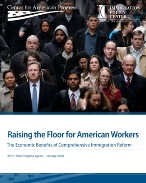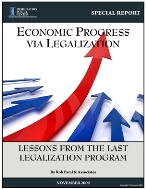While there are many facets to an intelligent immigration reform package, one thing is clear: legalization for undocumented immigrants helps all of us. Most economists recognize that legalization has worked in the past. After a significant percentage of the undocumented population legalized under the Immigration Reform and Control Act of 1986 (IRCA), information on IRCA applicants was used to assess the legislation’s impact. My own research has shown that IRCA provided immediate direct benefits by successfully turning formerly clandestine workers into higher-paid employees. Other researchers have shown that IRCA provided unexpected indirect benefits to the communities where legalized immigrants resided. After legalization, fewer of these immigrants sent money back to their home countries, and those who sent back money sent back less. More of their earnings were spent in their communities in the United States. Research also showed that the legalized population became participating community members—nearly two out of five people who legalized under IRCA were U.S. citizens by 2001.
What we learned from IRCA gives us a bird’s eye view into what we can expect to happen with a new legalization program. By examining three areas of concern: work, family, and community, we can see what economic and social benefits would be derived from a legalization program in 2010.
Published On: Thu, Nov 05, 2009 | Download File





